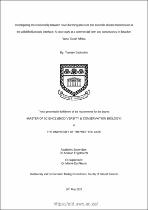Investigating the relationship between novel farming practices and zoonotic disease transmission at the wildlife/livestock interface: A case study at a commercial farm and conservancy in Beaufort West, South Africa
Abstract
In recent years, the intensification of agricultural activities in South Africa, has led to many of the sectors farmers adopting novel farming practices as a means of promoting economic productivity. One such practice, is the expansion of traditional livestock systems to include unconventional forms of stock such as wildlife. Despite the economic benefits of this approach, the threat of disease re/emergence remains a major obstacle, as both wild and domesticated animals are known reservoirs to a variety of disease-causing agents. Whilst many studies have directed their attention toward the surveillance of emerging pathogens within animal populations, less attention has been directed towards monitoring pathogens within environmental disease reservoirs (i.e., soil), which may be affected by these novel farming practices.

